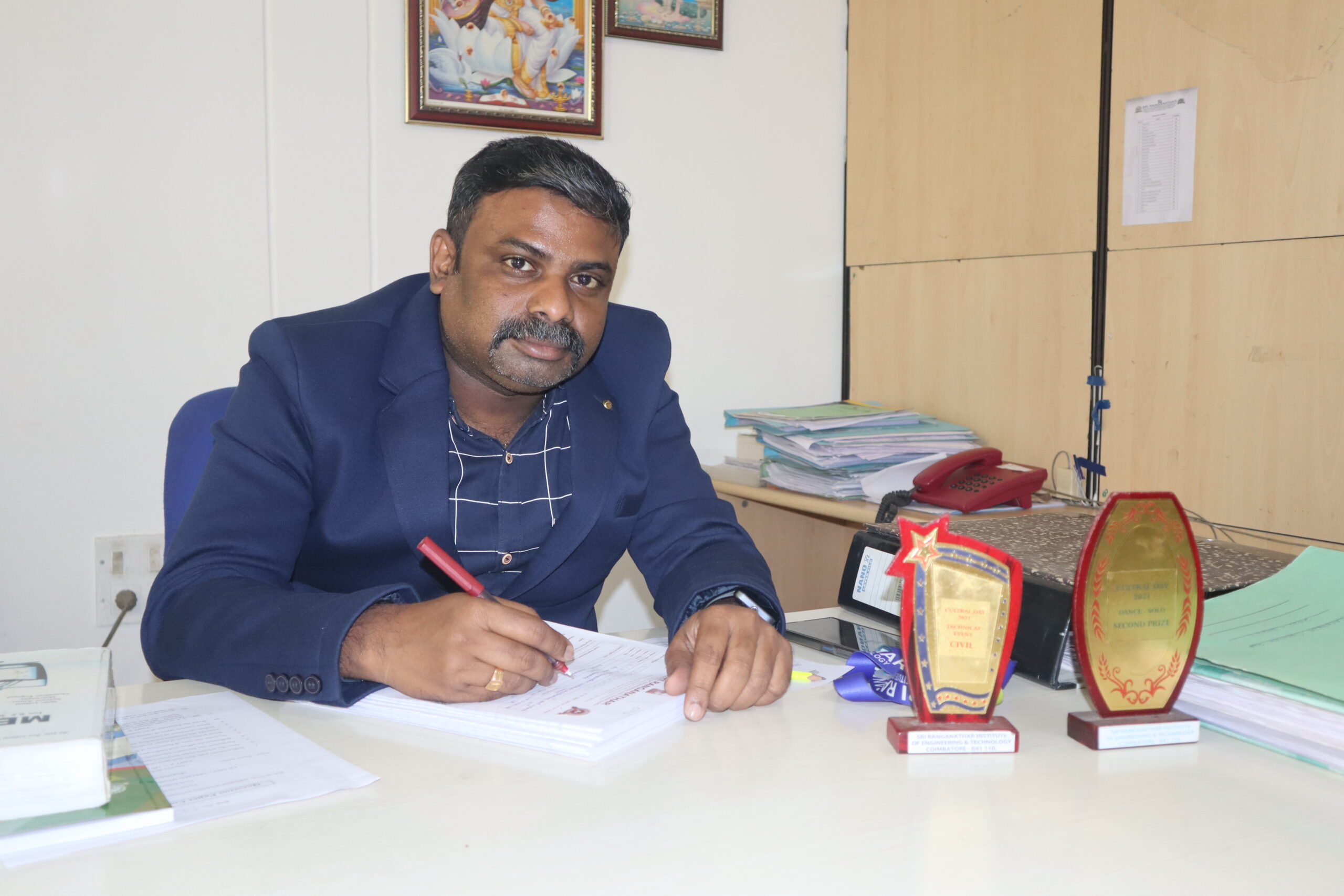- Phone : 0422 2697792
- 7502664999 / 7402667999
- Email : sritech@sriindia.net
Department of Civil Engineering
The Civil Engineering department is considered one of the oldest engineering disciplines, Civil Engineering involves planning, designing, and executing structural works. The profession deals with a wide variety of engineering tasks including designing, supervising, and construction activities of public works like roads, bridges, tunnels, buildings, airports, dams, waterworks, sewage systems, ports, etc., and offers a multitude of challenging career opportunities. The Department of Civil Engineering was started in the year 2010. The Department has well-experienced, dedicated faculty members with different fields of specialization. The Department is well equipped with the latest equipment in the Survey Lab, Strength of Materials Lab, Hydraulics Lab, Concrete & Highway Engg Lab, CADD Lab, Soil Mechanics Lab and Environmental Engineering Lab
Vision
To develop competent professionals for the Civil Engineering sector which provides Enviro – Economic friendly opportunities.
Mission
- To kindle the enterprising spirit in the mind of students enabling them to become future entrepreneurs through field level exposures and business cases.
- To facilitate students to research on Green Projects for saving Time, Resource & Energy.
- To encourage independent and lifelong learning in the broadest context of technology advancement.
- To educate students on professional ethics and customer – focused approach.
Engineering Graduates will be able to:
| PO1: | Engineering knowledge: Apply the fundamental knowledge of mathematics, science and Engineering for the solution of complex Civil Engineering problems. |
| PO2: | Problem analysis: Identify, formulate, research literature, and analyse complex Civil engineering problems reaching substantiated conclusions using first principles of mathematics, natural sciences, and engineering sciences. |
| PO3: | Design/development of solutions: Design solutions for complex Civil Engineering problems and design system components or processes that meet the specified needs with appropriate consideration for the public health and safety, and the cultural, societal, and environmental considerations. |
| PO4: | Conduct investigations of complex problems: using research-based knowledge and research methods including design of experiments, analysis and interpretation of data, and synthesis of the information to provide valid conclusions.. |
| PO5: | Modern tool usage: Create, select, and apply appropriate techniques, resources, and modern Civil Engineering tools including prediction and modeling to complex Civil Engineering activities with an understanding of the limitations. |
| PO6: | The engineer and society: Apply reasoning informed by the contextual knowledge to assess societal, health, safety, legal, and cultural issues and the consequent responsibilities relevant to the professional engineering practice. |
| PO7: | Environment and sustainability: Understand the impact of the professional engineering solutions in societal and environmental contexts, and demonstrate the knowledge of, and need for the sustainable development. |
| PO8: | Ethics: Apply ethical principles and commit to professional ethics and responsibilities and norms of the engineering practice. |
| PO9: | Individual and team work: Function effectively as an individual, and as a member or leader in diverse teams and in multidisciplinary settings. |
| PO10: | Communication: Communicate effectively on complex engineering activities with the engineering community and with society at large, such as, being able to comprehend and write effective reports and design documentation, make effective presentations, and give and receive clear instructions. |
| PO11: | Project management and finance: Demonstrate knowledge and understanding of the engineering and management principles and apply these to one’s own work, as a member and leader in a team, to manage projects and in multidisciplinary environments. |
| PO12: | Life-long learning: Recognise the need for, and have the preparation and ability to engage in independent and life-long learning in the broadest context of technological change. |
Programme Specific Outcomes:
On successful completion of the Civil Engineering Degree programme, the Graduates shall exhibit the following:
| PSO1 : | Knowledge of Civil Engineering discipline Demonstrate in-depth knowledge of Civil Engineering discipline, with an ability to evaluate, analyze and synthesize existing and new knowledge. |
| PSO2: | Critical analysis of Civil Engineering problems and innovation Critically analyze complex Civil Engineering problems, apply independent judgment for synthesizing information and make innovative advances in a theoretical, practical and policy context. |
| PSO3: | Conceptualization and evaluation of engineering solutions to Civil Engineering Issues Conceptualize and solve Civil Engineering problems, evaluate potential solutions and arrive at technically feasible, economically viable and environmentally sound solutions with due consideration of health, safety, and socio cultural factors |
| PEO1: | To prepare students for successful careers in Civil Engineering field that meets the needs of Indian and multinational companies. |
| PEO2: | To develop the confidence and ability among students to synthesize data and technical concepts and thereby apply it in real world problems. |
| PEO3: | To develop students to use modern techniques, skill and mathematical engineering tools for solving problems in Civil Engineering. |
| PEO4: | To provide students with a sound foundation in mathematical, scientific and engineering fundamentals necessary to formulate, solve and analyse engineering problems and to prepare them for graduate studies. |
| PEO5: | To promote students to work collaboratively on multi-disciplinary projects and make them engage in life-long learning process throughout their professional life. |
| YEAR | No.of.students |
| I YEAR | 14 |
| II YEAR | 12 |
| III YEAR | 16 |
| IV YEAR | 39 |
Year: 2023-2024
S.No. | REGISTER NUMBER | NAME OF THE STUDENT | COMPANY NAME | PACKAGE |
1. | 713920103008 | KAILASH B | BOSTON | 9LPA |
2. | 713920103004 | DEVA B | LITERACT | 3LPA |
3. | 713920103022 | SRI AISHWARYA D | OMEGA | 3LPA |
4. | 713920103315 | SANTHOSH RAJ J | OMEGA, DESIGN BRANDABLE AND ASSOCIATES | 3LPA, 4LPA |
5. | 713920103318 | VANJINATHAN U | BOSTON | 9LPA |
6. | 713920103317 | SURESH KUMAR P | VIYA WORKSPACE | 3LPA |
7. | 713920103311 | PRASANNA N | SAPL | 3LPA |
8. | 713920103028 | VIGNESHWARI M | KAARVENS STRUCTURAL CONSULTANCY | 3LPA |
9. | 713920103027 | VEERAKUMAR M | VENKATESHWARA CONSTRUCTION | 2LPA |
10. | 713920103005 | JAGADEESH M | VENKATESHWARA CONSTRUCTION | 2LPA |
11. | 713920103010 | KRISHNAVENI S | KHASS ENGINEERING PVT. LTD | 3LPA |
12. | 713920103015 | NAVITHA M | VKP GEOTECH | 3LPA |
13. | 713920103306 | LAVANYA S | VKP GEOTECH | 3LPA |
14. | 713920103014 | NAVEEN KUMAR D | NOVAC TECHNOLOGY | 2.5LPA |
15. | 713920103006 | JOHN ROHAN J | SITHAMBARAM BUILDERS | 2.6LPA |
16. | 713920103012 | MIRUDHULA DHARSHINI K | VARI MEDICAL ACADEMY | 2.5LPA |
17. | 713920103305 | BALAMURUGAN M | VARI MEDICAL ACADEMY | 2.5LPA |
18. | 713920103020 | SIVANAVILAN M | VARI MEDICAL ACADEMY | 2.5LPA |
19. | 713920103023 | SRIDHAR G | VENKATESHWARA CONSTRUCTION | 2LPA |
20. | 713920103302 | AKHIL R | CITY VIEW PLANNERS AND DESIGNERS | 3LPA |
21. | 713920103303 | ANISHKUMAR M | VIKRUTI STRUCTURES | 3LPA |
22. | 713920103307 | MANOJ KUMAR U | CITY VIEW PLANNERS AND DESIGNERS | 3LPA |
23. | 713920103308 | MOHAN RAJ S | VIKRUTI STRUCTURES | 3LPA |
24. | 713920103310 | MUHAIDEEN MUBARAK A | VIKRUTI STRUCTURES | 3LPA |
Year: 2022-2023
S.No. | REGISTER NUMBER | NAME OF THE STUDENT | COMPANY NAME | PACKAGE |
1. | 713919103004 | JAYARAMAN.A | HARI RAM CONSTRUCTION, ERODE | 3LPA |
2. | 713919103005 | JEEVANANTHAN.G | VRUKSHA CONSTRUCTION, COIMBATORE | 3LPA |
3. | 713919103008 | NAVEENKUMAR.S | SWETHA & ASSOCIATES PRIVATE LIMITED COIMBATORE. | 2LPA |
4. | 713919103009 | NAVEENKUMAR.R | SWETHA & ASSOCIATES PRIVATE LIMITED COIMBATORE.
| 2LPA |
5. | 713919103011 | RAJA.P | SWETHA & ASSOCIATES PRIVATE LIMITED COIMBATORE.
| 2LPA |
6. | 713919103012 | RAVIKUMAR.S.K | VIYA WORKSPACE | 3LPA |
7. | 713919103013 | SABAPATHY.K | SATHYAPAL ENGG. PVT. LTD., | 3LPA |
8. | 713919103017 | SIVASUBRAMANIAN.S | SRI GANESH BUILDER | 2.5LPA |
9. | 713919103018 | SRIKAVINNEYAN.R | HERA CONSTRUCTION | 3LPA |
10. | 713919103019 | SRI KOUSIKRAJA.S.K | HERA CONSTRUCTION | 3LPA |
11. | 713919103020 | THANGASELVAM.C | VIYA WORKSPACE | 3LPA |
12. | 713919103301 | HARISH.M | VRUKSHA CONSTRUCTION COIMBATORE | 3LPA |
13. | 713919103302 | KAVEEYA PREETHI.R | SWETHA & ASSOCIATES PRIVATE LIMITED COIMBATORE.
| 2LPA |
Year: 2021-2022
S.No. | REGISTER NUMBER | NAME OF THE STUDENT | COMPANY NAME | PACKAGE |
1. | 713919103003 | ASHOK KUMAR S | LEO BUILDERS | 2LPA |
2. | 713919103007 | ELAVALAGAN S | AK DEVELOPERS | 2LPA |
3. | 713919103008 | HARIHARASUDHAN P | AK DEVELOPERS | 2LPA |
4. | 713919103009 | JEYAMOORTHI M | LEO BUILDERS | 2LPA |
5. | 713919103010 | MAGESH M | SENBAGAM CONSTRUCTIONS | 2LPA |
6. | 713919103012 | MOHAMMED WASEEM | GREENFIELDS PVT LTD | 3LPA |
7. | 713919103014 | SANDEEP A | AK DEVELOPERS | 2LPA |
8. | 713919103303 | NARMADHA A | PERFECT DETAILING PVT LTD | 3LPA |
9. | 713919103304 | PREM KUMAR P | RV CONSTRUCTIONS | 2.5LPA |
10. | 713919103306 | SRIDHAR S | UNION OFFICE, METTUPALYAM SURVEYOR | 4LPA |
11. | 713919103307 | SRIRAM B | AMMAN CONSTRUCTIONS, START-UP | 2.2LPA |
12. | 713919103701 | DESHIKA M | EXTRAMARKS PVT LTD., PERFECT DETAILING PVT LTD | 3LPA |
DEPARTMENT FACILITIES
HIGHLIGHTS OF THE DEPARTMENT
- MoU with various construction and surveying Industries
- Funded project for students from TNSCST council
- 100% Student placement in various construction fields.
- Inplant training and Internships for all senior students.
- UBA team working with budding civil engineers in Rural area.
HOD’S DESK
Learning is not just series of instructions but a passion, which goes beyond books. The department will engage in supporting the students to refine the necessary skills, attitudes and aptitude towards the corporate placement. Apart from academics, students will be encouraged to take part in extra circular and co-curricular activities to bring laurels to the department.
The teaching learning process of the faculty and student are monitored by ERP to ensure quality education. The department has introduced Value Added Courses (VAC) to students to bridge the gap between theory and practice of Civil Engineering by organizing series of expert lecturer form industry. Department is also providing Software training to enhance the soft skills, Personality Development, communication skills, Team Building activity, Decision Making and Leadership Quality to enable them to achieve great heights in this competitive world. Department also offers Stipend internships for the students in various industries which have been tied up with the institution.
I look forward for preparing the students to face the challenges of the engineering sector and offer technological solutions for the betterment of the society.

Dr. A SURESH KUMAR M.E., Ph.D.,
ASP & HEAD OF THE DEPARTMENT
DEPARTMENT OF CIVIL ENGINEERING
Email: hodce@sriet.ac.in
Mobile: 8637644650
FACULTY MEMBERS
S.NO. | NAME OF THE FACULTY | DESIGNATION | JOINING DATE | QUALIFICATION | NATURE OF ASSOCIATION (REGULAR/CONTRACTUAL) |
1. | Dr. A. SURESH KUMAR | HOD | 01.11.2022 | M.E., Ph.D. | REGULAR |
2. | Mr .K. KARTHIKEYAN | ASSOCIATE PROFESSOR | 10.06.2017 | M.E., (Ph.D.) | REGULAR |
3. | Mrs. M. P. MEERA | ASSOCIATE PROFESSOR | 18.01.2024 | M.E., (Ph.D.) | REGULAR |
4. | Mrs. U. NANDHINI | ASSISTANT PROFESSOR | 07.07.2021 | M.E., (Ph.D.) | REGULAR |
5. | Mr. K. VIJAY SANKAR | ASSISTANT PROFESSOR | 01.03.2022 | M.E., (Ph.D.) | REGULAR |
6. | Mr. S. PREAM KUMAR | ASSISTANT PROFESSOR | 06.07.2022 | M.E., (Ph.D.) | REGULAR |
7. | Mrs. M. PRIYANKA | ASSISTANT PROFESSOR | 03.07.2023 | M.E. | REGULAR |
8. | Mr. K. ASWIN KUMAR | ASSISTANT PROFESSOR | 02.05.2024 | M.E. | REGULAR |
The faculty in the department is a rich blend of personnel with Industrial and Professional experience. Our dedicated staff members have sound knowledge in emerging areas. Most faculty members are accomplished postgraduates with considerable research and academic experiences. The breadth and depth of research interests of the academic staff ensures a high standard lecture courses and provide excellent opportunities for challenging and stimulating final year projects. Individual lecturers supplement their delivery using blackboards, overhead projectors and video projection

Dr. A Suresh Kumar
HOD, M.E., Ph.D

Mrs.U.NANDHINI
Assistant Professor, M.E(Ph.D.)

Ms.J.S.JESLIN
Assistant Professor, M.E

Mr.K.VIJAY SANKAR
Assistant Professor, M.E(Ph.D.)

Mr.S.PREAM KUMAR
Assistant Professor, M.Tech.,(Ph.D.)

Mrs C Lathiga
Assistant Professor, M.E

Mrs M P Meera
Assistant Professor, M.E.,(Ph.D.)

Ms.M.PRIYANKA
Assistant Professor, M.E

Ms.M.PRIYANKA
Assistant Professor, M.E

Mr.K.KARTHIKEYAN
Assistant Professor, M.E

DR.M.H.VIJAY KUMAR
Professor

Mrs.U.NANDHINI
Assistant Professor, M.E(Ph.D.)

Ms.J.S.JESLIN
Assistant Professor, M.E

Mr.K.VIJAY SANKAR
Assistant Professor, M.E(Ph.D.)

Mr.S.PREAM KUMAR
Assistant Professor, MTech

Mrs.J.SRISINDHU
Assistant Professor, M.E
Subscribe & Follow us
SRIET E-NEWSLETTER

- SF NO: 162, Athipalayam,
- Thudiyalur to Kovil Palayam Road,
- Coimbatore, India - 641 110
- 0422 2697792
- 7502664999
- 7402667999
- sritech@sriindia.net
